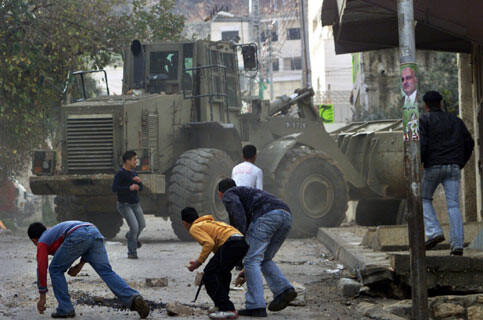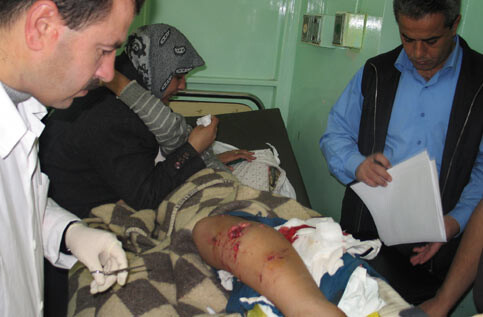The Electronic Intifada 12 January 2006

Palestinian boys throw stones at an Israeli bulldozer during an incursion to the West Bank city of Nablus December 21, 2005. (MAANnews/Bilal Nasser)
The Israeli military is using dogs as a reconnaissance tool in its actions against Palestinian people in the Occupied Palestinian Territory, including the Balata refugee camp in Nablus. The dogs’ actions are controlled remotely through sophisticated technology; commands are issued by way of a radio transmitter. This evokes much fear and deepens the alienation of Palestinians.
The way Israel is using dogs is yet another dehumanising step, taking place under the “cover” of war. The dogs follow the orders of their military masters. In no way should the international community permit the Israeli government to escape its responsibility for these barbaric practices in enforcing its brutal occupation of the Palestinian territories.
Problems at the checkpoints near Nablus
On the morning of Friday, 9 December a twelve-year old child carrying a plastic bag attempted to cross Howara checkpoint at the northern entrance to the city of Nablus. The soldiers apparently feared the plastic bag contained a bomb and grabbed the boy by the neck. He was ordered to drop the plastic bag in a field near the checkpoint and return to the checkpoint while the soldiers aimed their guns in his direction.
On his return, a group of six to eight soldiers again grabbed him by his neck. The soldiers were laughing. In the meantime, a bomb specialist had a look at the plastic bag. It turned out that it contained white bread dough with some wires and a battery attached.
It is difficult to assess what was really happening with the little boy. Was he acting out a childish fantasy of scaring the soldiers? In apartheid South Africa, children scared soldiers by throwing avocados in their tanks. At first glance, avocados look like hand grenades.
Following the incident of the bag, all Palestinians under thirty years of age were prevented from passing through the checkpoint out of Nablus for days. This could only be interpreted as collective punishment by the Israeli military in response to the naive act of a 12-year old boy.
Increased military activity
The number of military actions in Balata refugee camp and Nablus is increasing. Since the Friday of the boy’s “toy bomb”, the Israeli military has been invading Balata camp every night. Operations to arrest wanted persons last for hours and people lie awake because of the sound of shooting.
According to eyewitnesses, on the morning of Tuesday, 13 December a huge Israeli military force invaded Nablus. At the time of the operation, Palestinian youths were on their way to school. The youths reacted angrily with a rain of stones aimed at the soldiers’ armoured jeeps. The soldiers responded with gunfire, killing one child and injuring 25 children.
The Palestinian Centre for Human Rights (PCHR) publishes weekly reports on the situation in the Occupied Palestinian Territories. One report mentioned that on 22 December 2005 “the IOF besieged an under-construction building (sic) in Nablus. They opened fire at the building, killing three Palestinians who were hiding inside.”
In PCHR’s weekly report of 29 December to 4 January, they reported the following: “IOF (Israeli Occupation Force) conducted 25 military incursions into Palestinian communities in the West Bank. During these incursions, IOF raided houses and arrested 30 Palestinian civilians, including 9 children and a girl. IOF also transformed 5 houses into military sites. IOF used undercover units and trained dogs during these incursions.”1
Astonishing appearance
On Monday, 19 December 2005, at two o’clock in the middle of a cold night, an Israeli military unit invaded Balata refugee camp and attacked the homes of several inhabitants in a seemingly random manner. At one of the homes, a dog appeared. It looked like a robot, wearing a wireless speaker in its ear, a spotlight and a wireless camera. The dog received instructions from a soldier within the unit. It appeared to be doing the job of the soldiers, searching for what the military calls “terrorists”.
The 40-year old father in the house answered the front door and was taken outside by the soldiers. They forced him to undress and stand naked against the wall of his house for almost an hour in the cold night until the soldiers withdrew. The father saw the dog entering his home where it bit his twelve-year old child a few times in the leg. The third bite ripped into the child’s flesh, leaving a wound about the size of a cigarette box. The soldiers did not care about the child. The child could only be taken to hospital for medical treatment after they left.

Basil Waleed Abu Dahooq recovering at the hospital after he was bitten by an Israeli army dog in the West Bank city of Nablus December 19, 2005. (MAANnews/Bilal Nasser)
The result of this absurd operation was devastating for this family. A father was humiliated, a child badly hurt and no person was taken into custody because the soldiers apparently came to the conclusion that there was no “terrorist” present.
Dehumanising the enemy leads to violations of human rights
In any war, a country’s military is capable of drawing an ugly, dehumanising picture of its enemy as justification for aggressive actions, including arbitrary killings, bombings and assassinations. The development of long distance “precision” weapons create a distance from one’s enemy and eliminates the need for the aggressor to look at its enemy as a human being. Dehumanising the enemy also leads to violations of international law.
The horrors of war, which have seen terrible acts taking place, led directly to the international community creating laws to protect innocent civilians and prevent them from being unduly victimised, and to hold individuals and states accountable when those laws are broken. These laws can be found in the Geneva Conventions as well as international human rights conventions such as the International Convention on the Rights of the Child.
Israel’s soldiers and its policies violate many of these international laws and innocent civilians, including refugees, continue to suffer for it while the rest of the world turns a blind eye.
EU must hold Israel accountable
As an occupying power, Israel holds principal responsibility in international law for protecting Palestinians in the Occupied Palestinian Territories. The arbitrary arrests and detention of Palestinians and other barbaric practices of the Israeli military are immoral and lead to serious and even grave violations of human rights.2
The government of Israel is not complying with its obligations under international human rights and humanitarian law. The European Union and its members have a responsibility, as members of the United Nations and as signatories of the Geneva Conventions, to hold the government of Israel accountable.
Adri Nieuwhof and Walid Abdelhadi are human rights advocates based in the Netherlands and the Occupied Palestinian Territories respectively. Many events described in this article are based on eyewitness accounts and are confirmed by the authors. They are furthermore consistent with reports received by diplomatic missions, news articles and several documented reports from numerous local and international human rights organisations, including Human Rights Watch and Amnesty International.
Endnotes
[1] Weekly report on human rights violations, PCHR (5 January 2006)
[2] Administrative detention should be banned, Jeff Handmaker and Adri Nieuwhof, The Electronic Intifada (11 November 2005)
Related Links



